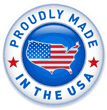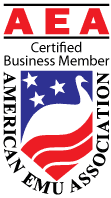 |
|
Why Use AEA Certified Fully Refined Oil?
 |
We offer both Fully Refined & AEA Certified Fully RefinedŽ Emu Oil.
|
What Is Fully Refined Emu Oil & What is AEA Certified Fully RefinedŽ Emu Oil:
Pure Emu Oil that has been properly processed and has met the stringent specifications listed in the Emu Oil Trade Rules for Fully Refined Emu Oil.
This Fully Refined designation or specification for pure emu oil is primarily for the safety of the consumer. If moisture is above the 0.10% level, bacteria will have a tendency to grow. By removing the peroxides and free fatty acids, other contamination components will be also removed, for example; hormones, toxic metals, pesticides, viruses and infections. By testing certain fatty acids it can be verified that the oil is truly emu oil and not cut or adulterated with some other types of oils.
Danger only exists when the pure emu oil is to be used on the human skin or is to be taken orally. If the pure emu oil is not Fully Refined, there is risk that the oil is contaminated or has not been sterilized.
AEA Certified Fully RefinedŽ emu oil is pure emu oil that has been approved by the AEA (American Emu Association). In order to be approved each batch must be tested at the time of processing by a third party AOCS (American Oil Chemist Society) certified chemist. The chemist will produce a COA (Certificate of Analysis) that is then submitted to the AEA for approval. This approval is based on whether or not the COA results meet the specifications set in the Emu Oil Trade Rules for Fully Refined Emu Oil. Only pure emu oil that has gone through this stringent evaluation process can legitimately carry the AEA certification seal.
The trade rules were established by the American Emu Association under the advisement and consultation of members of the American Oil Chemist Society. These rules were modeled after trade rules established by other natural oil industries, such as soybean, cottonseed, rice oil and so forth. These well-defined trade rules help the buyer know what grade of pure oil that they are purchasing. The Emu Oil Trade Rules are divided into three different grades, Crude Emu Oil, Once Refined Emu Oil and Fully Refined Emu Oil. The Emu Oil Trade Rules are defined and displayed here.
From studies, the feed was found to affect the color of the emu oil, but the feed does not affect the oils beneficial activity.
Emus are different from many animals in that their body temperature is so high that medication and worming is not normally necessary. The emu is a very hearty animal that appears to be immune to most diseases that affect other livestock in America. The typical American farmer does not normally use any antibiotics on their farm-raised emus as it is unnecessary and there hasn't been sufficient research performed to identify the responsiveness of an emu to antibiotics. The typical American emu farmer does not use growth hormones or steroids on their farm raised emus as the feed industry has developed superior natural feeds that closely match the nutrition that the emu requires to obtain maximum weight and production.
Emu oil pricing is determined by the analytical analysis of the emu oil to be sold and, as in all commodities, market supply and demand. The analytical analysis of the grade of emu oil to be sold will correspond to one of the Trade Rule specifications designated by the American Emu Association in the Emu Oil Trade Rules.
Emu Oil Grade Price Comparison
Crude Emu Oil
Least Expensive; Requires further processing before being utilized for cosmetic and manufacturing uses due to the possibility of impurities; Suitable for use in soap making and animal feed products.
Once Refined Emu Oil
Mid-Range Pricing; Requires further processing before being utilized for most cosmetic and manufacturing uses due to the possibility of impurities; Suitable for soap making applications, industrial use, and some topical uses.
Fully Refined Pure Emu Oil
Premium Pricing; No further processing required; Food-grade oil suitable for all cosmetic and manufacturing uses.


 Your basket is empty
Your basket is empty

